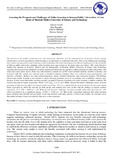| dc.contributor.author | Owidi, Salmon | |
| dc.contributor.author | Wangila, Eric | |
| dc.contributor.author | Shiundu, John O. | |
| dc.contributor.author | Simiyu, Mukasa | |
| dc.date.accessioned | 2023-12-07T15:08:24Z | |
| dc.date.available | 2023-12-07T15:08:24Z | |
| dc.date.issued | 2023-11-21 | |
| dc.identifier.uri | https://doi.org/10.51867/ajernet.4.2.122 | |
| dc.identifier.uri | https://ajernet.net/ojs/index.php/ajernet/article/view/225 | |
| dc.identifier.uri | http://ir-library.mmust.ac.ke:8080/xmlui/handle/123456789/2470 | |
| dc.description.abstract | The increase in the number of internet users, the demand for education, and the widespread use of electronic devices among scholars have created a potential in online learning as an alternative to traditional education. This can be linked proper planning, clear online learning policies and trained personnel to facilitate the online learning process. Recent studies point to the possibility of African public universities adopting online learning more aggressively in the future than ever before. This study therefore outlines the opinions of lecturers, students and the management of Masinde Mulari University of Science and Technology regarding the prospects and challenges of online pedagogical infrastructure and how it affects learning in public universities. The study used a descriptive survey. Data was collected from a sample size of 682 which included students, members of faculty, and technical staff. The sample was selected using a stratified sampling technique. Data was collected using questionnaires and interview schedules. Analysis was done using frequencies, means, standard deviations, and regression analysis. The findings showed that mobile learning is the solution to online learning problems given its accessibility and availability amongst most learners. It also shows that online learning provides customized learning experiences in which learning is student-centered. The results from ordered logistic regression, (Wald = 0.673,) showed that indeed challenges of use of online pedagogical infrastructure affects learning in public universities. This was confirmed by the analysis of interval data using simple linear regression in which the outcome for both faculty and students also were in line with the findings of logistic ordered regression, | en_US |
| dc.language.iso | en | en_US |
| dc.publisher | AFRICAN JOURNAL OF EMPIRICAL RESEARCH | en_US |
| dc.subject | Assessing, Prospects, Challenges, Online, Learning, Kenyan, Public, Universities, A University, Science, Technology | en_US |
| dc.title | Assessing the Prospects and Challenges of Online Learning in Kenyan Public Universities: A Case Study of Masinde Muliro University of Science and Technology | en_US |
| dc.type | Article | en_US |

